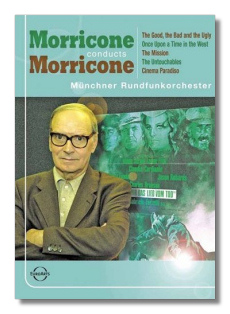
The Internet's Premier Classical Music Source
Related Links
- Morricone Reviews
- Latest Reviews
- More Reviews
-
By Composer
-
Collections
DVD & Blu-ray
Books
Concert Reviews
Articles/Interviews
Software
Audio
Search Amazon
Recommended Links
Site News
 DVD Review
DVD Review
Morricone Conducts Morricone

- Selections from:
- The Untouchables
- Once Upon a Time in America
- The Legend of 1900
- Cinema Paradiso
- H2S
- The Sicilian Clan
- Metti una sera a cena
- Maddalena
- The Good, the Bad, and the Ugly
- Once Upon a Time in the West
- A Fistful of Dynamite
- Canone Inverso
- Investigation of a Citizen Above Suspicion
- According to Pereira
- The Working Class Goes to Heaven
- Casualties of War
- The Desert of the Tartars
- The Mission
Susanna Rigacci, soprano
Gilda Buttà, piano
Ulrich Herkenhoff, panpipes
Henry Raudales, violin
Norbert Merkl, viola
Bavarian Radio Choir
Munich Radio Orchestra/Ennio Morricone
EuroArts DVD 2054698 100min LPCM Stereo Dolby Digital DTS Anamorphic Widescreen
It's too early to do a definitive retrospective of Ennio Morricone's career – even now he is earning accolades for his score to the new Hungarian film Fateless. Nevertheless, one can't help celebrating the impressive body of music that this man has written for films in the last 38 years. He is the most creative and original composer ever to have scored a film. Hearing a program such as this one is tantamount to having one's life as a serious movie-goer flash before one's eyes. And a 100-minute concert barely scratches the surface; without trying, I can come up with 20 other scores that could just as easily have been represented here. Furthermore, I consider myself to be a well-seasoned Morricone fan, but this concert includes music from several films of which I was completely unaware. According to Pereira ? H2S ? (Someone made a film about rotten-egg gas? According to IMDb, this film never was released outside Italy.)
This DVD (directed, by the way, by the composer's son Giovanni) captures a live concert in the Philharmonie im Gasteig on October 20, 2004. The program was specially assembled for this Munich concert with a view to presenting the most well-rounded view of the composer, from the "spaghetti Western" scores which made his name in the 1960s to films as recent as 1999's Canone Inverso. Intelligently, Morricone goes from one piece to the next without pause, although there's an intermission in the middle, and a natural burst of applause in the second half after Canone Inverso's extended concerto for violin and piano. On a few occasions, brief clips of the films in question are projected, although it is not clear if they were visible to the audience, or if they have been added just for the DVD. In any event, they say nothing that the music can't say for them.
Inescapably, this concert sometimes feels a bit like a variety show, as one soloist and then another steps forward, but the effect is not too intrusive. Even though Morricone himself is not the most demonstrative of conductors, one feels that the performers are enjoying themselves; there's a telling moment when we see a chorus member bobbing her head to The Sicilian Clan. (I think we all feel that way!) Not all of Morricone's effects can be realized in a concert hall – for example, the signature wail/yodel in The Good, the Bad, and the Ugly has been recreated with clarinets, and I miss the out-of-tune piano so brilliantly used in the original soundtrack to Investigation of a Citizen Above Suspicion. And the organ used during Maddalena ? Far out! Soprano Rigacci is no Edda dell'Orso – in fact, she is somewhat flat at her first appearance, and at times she has difficulties making herself heard over the chorus and orchestra. On the other hand Gilda Buttà does excellent work on the piano, and violinist Henry Raudales cuts loose on Canone Inverso, although the microphoning makes his tone sound artificial and ugly.
These are a lot of niggling little concerns, and I have others, but none of them prevents me from loving this performance from the first note to the last. This is a banquet for Morricone fans. The concert has been beautifully captured in sight and sound by the production team. Viva Morricone! May he score films for another 38 years!
Copyright © 2006, Raymond Tuttle




















